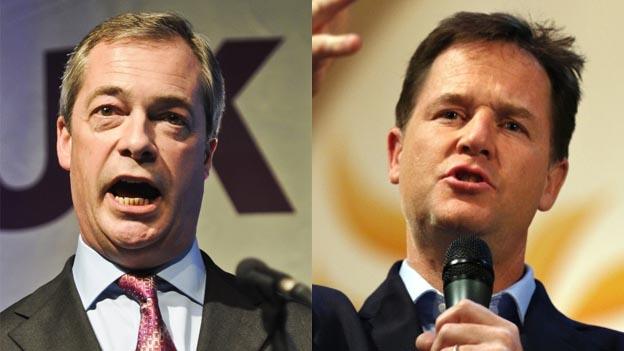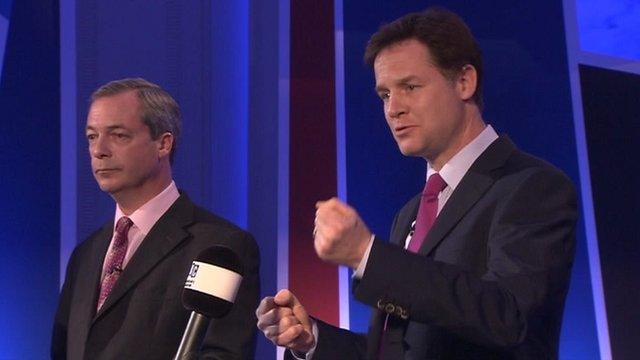Nick v Nigel - Who will win?
- Published

So who will win? Will it be Nigel or Nick? Which leader will emerge victorious in the battle of Europe?
All questions pundits and pollsters are lining up to ask ahead of tonight's first debate between the men who lead UKIP and the Liberal Democrats (the BBC's TV debate is in a week's time).
All questions which are equally daft.
Just think about it for a moment. How many people will be listening to their radios or watching their TVs tonight weighing up whether to vote for Farage or for Clegg? What is the size of that subset of the electorate who are undecided between getting out or staying in the EU, let alone between major curbs to immigration or arguing that it helps make us all richer? So how many people are likely to change their minds and switch from backing Farage to Clegg or vice versa?*
Then ask yourself whether this debate might not alter the argument about whether Britain stays in or gets out of the EU. It might. But it's going to be an awfully long time before anyone gets to vote on that and that alone. The earliest predictable date we might get a vote in an EU referendum is in 2017 if the Tories win the next election, if they stick to their promise, if they're not in a coalition and if negotiations about reforming the EU don't drag on beyond that date.
Poll ratings
The truth is both Farage and Clegg could turn out to be winners tonight and next week. They both lead small parties which thrive on publicity. They both want definition with the electorate and need to motivate their activists to get out the vote in May's European elections. They both want the backers of other parties to lend them votes as a reward for standing up for what they believe on Europe.
That was the argument Team Clegg made to Team Farage when they came up with the idea for a debate between the two men which excluded David Cameron and Ed Miliband.
The Lib Dems fear that on their current poll rating - below 10% - they could lose all 12 of their MEPs. They only need to increase that rating by 2 or 3% to save a significant number under the PR system of voting in elections for the European Parliament.
Roughly 40% of the electorate say they back Britain's continued membership of the EU so he only needs to persuade a small subset of those people to support the self styled "party of in" to make the difference between electoral oblivion and survival; between being written off as a political force and surviving to fight another day; between party despair and party defiance.
Nigel Farage originally wanted to use this debate to make the case for him featuring in the TV leaders debates at the next general election alongside Cameron and Miliband as well as Clegg. The Lib Dems told his aides that they should seize the chance to present Farage as leading "the party of out" appealing to all those Tories who are more angry with Brussels than they sense their own party leader is.
So, tonight both men know that they are like TV wrestlers. A few punters may come along to scream encouragement for their guy but most have turned up to witness an entertaining scrap with little care about the outcome.
"Ladies and Gentlemen, your votes have been cast... the judges have reached their verdict...the winner of tonight's debate is... (cue fanfare, drum roll, spotlights) Nick AND Nigel."
(Unless, of course, something goes wrong which is why I, for one, will be watching tonight and next week on BBC2)
* The answer, by the way, is small but not zero. Some "protest voters" who dislike either of the big two parties may switch between the Lib Dems and UKIP either in ignorance of their policies (believe it or not some UKIP supporters tell pollsters they want to stay in the EU)
- Published26 March 2014

- Published26 March 2014
